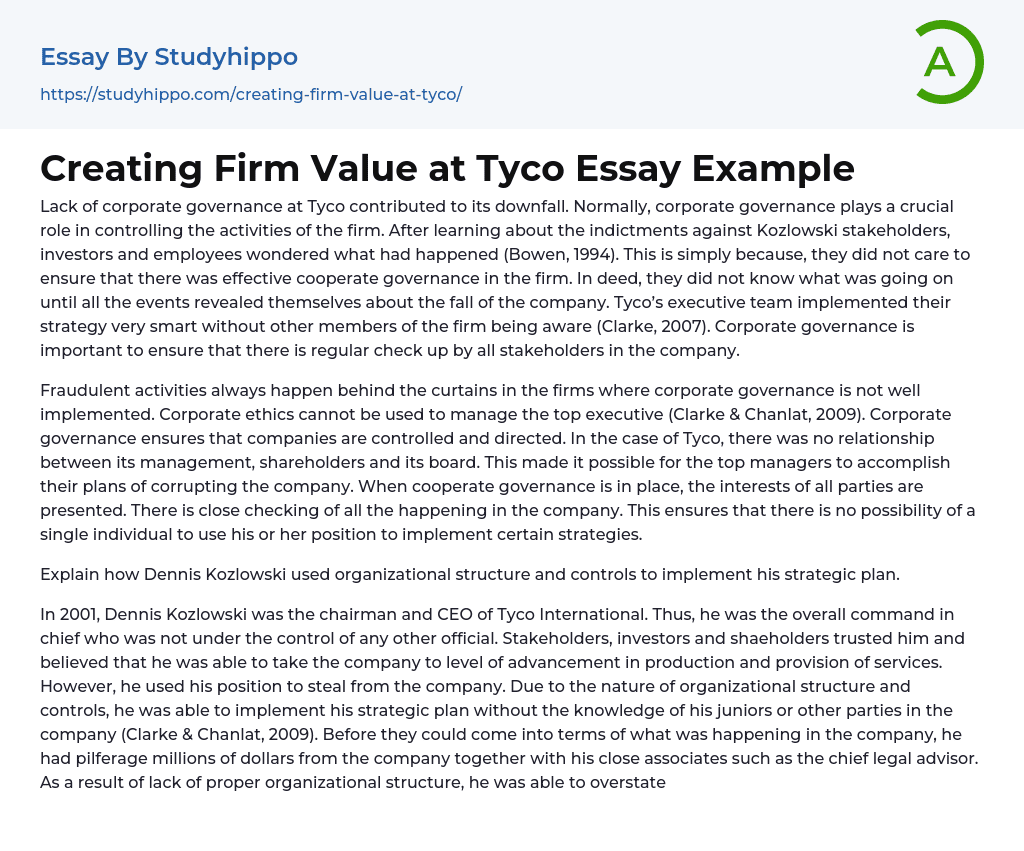The lack of corporate governance at Tyco led to its downfall. Effective corporate governance is crucial for controlling firm activities. After the indictments against Kozlowski, stakeholders, investors, and employees were left wondering what had happened because proper corporate governance was not ensured in the firm, and they were unaware of the events leading to the company's fall. The executive team cleverly implemented their strategy without the rest of the firm being aware. Corporate governance plays an important role in conducting regular check-ups by all stakeholders. When corporate governance is not properly implemented, fraudulent activities can occur. Top executives cannot be managed solely through corporate ethics. Corporate governance ensures control and direction of companies. In the case of Tyco, there was no relationship between management, shareholders, and the board, allowing top managers to corrupt the company. With proper corporate governance in place, all parties' interests a
...re represented and there is close monitoring of company activities to prevent individuals from implementing personal strategies through their positions.In 2001, Dennis Kozlowski, Tyco International's chairman and CEO, utilized the company's organizational structure and controls independently to execute his strategic plan. He held ultimate authority within the organization, gaining the trust of stakeholders in his ability to advance production and service offerings. However, Kozlowski misused this authority by embezzling funds from the company with assistance from associates. Exploiting relaxed organizational structure and controls, he successfully executed his plan without detection. When discovered, Kozlowski had already stolen millions by manipulating income reports and hiding executive compensation. The lack of proper controls or provisions for corporate governance resulted in Tyco International going bankrupt as top management operated autonomously without oversight internally or externally.The
organizational structure should ensure regular monitoring of senior members' conduct and behaviors to promote responsible behavior due to observation (Clarke, 2007). Additionally, an ineffective organizational structure can lead to the development of personal interests that prioritize individual gain over the well-being of the entire organization, ultimately resulting in its downfall. In Tyco's case, leadership played a significant role in executing their strategy. The leadership team was comprised of high-level officials, with Dennis Kozlowski as the leader. Unfortunately, strategic leadership sometimes involves individuals with flawed motives who exploit their position for personal gain. In this instance, the top leaders used their authority to implement their strategy (Clarke, 2007). Notable figures involved in this process were Dennis Kozlowski, CFE Mark Shwartz, and chief officer Mark Belnick. These leaders even organized extravagant parties and engaged in questionable financial transactions without proper accountability. Ultimately, Tyco's downfall can be directly attributed to the erosion of its leaders' values driven by greed (Bowen, 1994). The leadership team successfully transformed the organization's behavior and ethical standards to prioritize self-interest at the expense of financial misappropriation.
Assessing how strategic entrepreneurship contributes to creating firm value at Tyco is crucial since its main purpose is to enhance profit and wealth for the company. Within Tyco, general managers can utilize strategic entrepreneurship by employing various tools, techniques, and concepts to improve the company's wealth (Clarke, 2007). The value of Tyco can be increased through innovations, networks, organizational learning, effective management teams, governance, and ensuring positive growth. Hence, it is essential for general managers to take action and play a vital role in enhancing the organization's value.
In conclusion, the downfall of Tyco International was a result of
lacking corporate governance, compromised ethics among top managers, and a deficiency in well-defined strategic entrepreneurship to monitor and control personal interests from being implemented.
- Entrepreneur essays
- Walt Disney essays
- Henry Ford essays
- Bernie Madoff essays
- Rockefeller essays
- Bill Gates essays
- Steve Jobs essays
- Absolutism essays
- Appeal essays
- Bourgeoisie essays
- Contras essays
- Corporate Governance essays
- Corruption essays
- Democracy essays
- Democratic Party essays
- Developed Country essays
- Dictatorship essays
- Elections essays
- European Union essays
- Federalism essays
- Foreign essays
- Foreign policy essays
- Gentrification essays
- Hillary Clinton essays
- Income Tax essays
- International Relations essays
- John Marshall essays
- John Stuart Mill essays
- Left-Wing Politics essays
- Liberty essays
- Military essays
- Monarch essays
- Monarchy essays
- Political Corruption essays
- Political Party essays
- Political Science essays
- President Of The United States essays
- Public Service essays
- Red Cross essays
- Reform essays
- Republic essays
- Revenge essays
- Social Security essays
- Sovereign State essays
- State essays
- Supply essays
- Terrorism essays
- United Nations essays
- World Trade Organization essays
- John Locke essays




